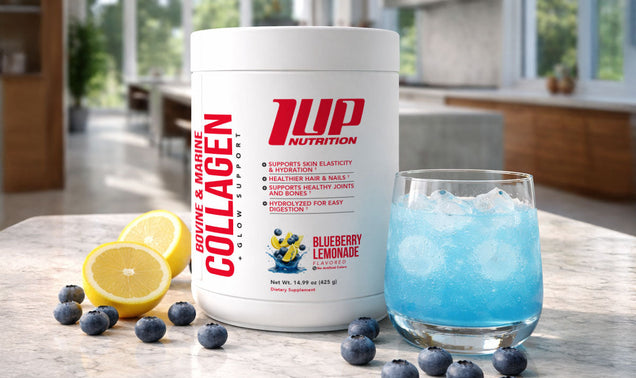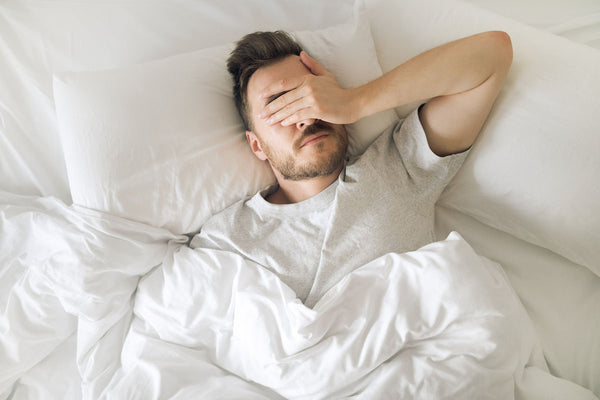Feeling hungry and tired all the time is common when you’re dieting, but what if you’re maintaining, recomping, or trying to build muscle? Is it normal to still feel hungry and tired all the time, even when you’re supposedly eating enough food?
Believe it, or not, YES! It is.
There are a number of things that can lead you to feeling hungry and tired all the time (besides dieting for fat loss). The good news is that we’re here to explain why that may be happening as well as give some suggestions to help you reduce those feelings and naturally improve your energy levels.
7 Possible Reasons Why You’re Always Hungry and Tired
#1 Not Eating Enough Protein
Protein’s role in muscle recovery and growth is well-established and known by individuals even outside of the fitness industry. What’s less known about protein is its role in helping you feel full.
In fact, protein is the most satiating macronutrient, which means that it helps you feel full, and thus less likely to be hungry (and therefore snack between meals).
The problem is that modern dietary guidelines underemphasize the importance of protein, which can lead men and women to undereat protein.
The general rule of thumb for physically active people is to consume one gram of protein per pound of bodyweight.
So, if you weigh 150 pounds, then you would want to eat at least 150 grams of protein per day (preferably evenly distributed across your meals throughout the day). This ensures that you’re giving your body a steady supply ofessential amino acids (EAAs) it needs to support muscle recovery and keep hunger in check.
The best sources of protein are complete proteins (ones that contain all nine EAAs). This includes:
- Lean red meat
- Chicken
- Turkey
- Fatty fish
- Eggs
- Greek Yogurt
- Cheese
- Cottage cheese
- Shellfish
For those of us that struggled with to get enough protein each day, having a scoop (or two) of protein powder throughout the day can help to keep hunger in check (and help meet daily protein requirements).
1UP offers a range of high-quality, delicious-tasting protein powders, including whey protein, egg white protein,vegan protein, and clear whey protein.
#2 Not Enough Sleep
Sleep is essential for our bodies to function properly (why do you think we’ve evolved to spend ~⅓ of our lives sleeping?).
During sleep is when our bodies perform the majority of repair, recovery, and growth that’s needed to help us feel naturally energized, alert, happy, and healthy each and every day.
On the flip side, not getting enough sleep (aka sleep deprivation) can cause fatigue, irritability, brain fog, poor workout performance, fat gain, and hunger.
This is due to a number of factors, including a severe disruption in your hormone levels (namely cortisol and ghrelin -- the stress and hunger hormones, respectively).[1,2,3]
Ideally, you want to get 7-9 hours of quality sleep each night (yep, even on weekends).
To help encourage relaxation and sleep, there are several things you can do each evening:
- Avoid caffeine and alcohol before bed
- Limit blue light exposure at least 2 hours before bed (it disrupts melatonin secretion)
- Have a consistent bedtime
- Listen to calming music
- Journal/pray/meditate
- Read
- Take a warm bath or shower
- Stretch/light yoga
- Have a cup of herbal tea (e.g. chamomile)
You can also try a nighttime relaxation aid, such as Recharge PM or Beauty Dream PM, which contains natural calming and sleep-promoting ingredients as well as metabolic enhancers that support the body’s ability to burn fat while you sleep!
#3 Eating Too Many Processed Foods
Generally speaking, ultra-processed foods (cookies, cakes, candy, chips…essentially anything in a box or bag at the grocery or convenience store) are chock full of simple carbohydrates (sugar), cheap fats, and salt. This magical combo induces your body to continually eat more and more. The catch is that while you’re ingesting hundreds (if not thousands) of calories, you don’t really ever get full.
This is due to the fact that the vast majority of processed foods are woefully deficient in protein and fiber -- two things that help fill you up.
The fast carbs in processed foods also are rapidly digested which may give you a temporary burst of energy but ultimately leave you feeling tired shortly thereafter.
Keep in mind that not all processed foods are bad, and there can be a time when processed foods and fast-digesting sugars can be useful such as during and immediately after a tough workout. A few examples of processed foods that can improve your workouts and recovery include protein powder, protein bars, and intra workouts, such as 1UP Tri-Carb.
Remember, life is about balance. If the majority of your diet is based around whole foods, then it’s ok to have some processed foods as well. But, if you’re always feeling tired and hungry and you’re consuming a lot of processed foods each day, then you may want to re-evaluate your nutrition plan.
#4 Micronutrient Deficiencies
Micronutrients include vitamins, minerals, antioxidants, polyphenols and other dietary elements that don’t impact your daily calorie intake but they do serve important (often essential) roles in the health, performance, recovery, and detoxification of the human body.
Building off of the previous point, if you’re consuming too many processed foods and not enough whole foods, you may be deficient in one (or more) critical micronutrients. A few of the most common micronutrient deficiencies, especially among individuals who are physically active, include vitamin D, magnesium, iron, zinc, and Vitamin B12.
Iron and vitamin B12, in particular, play a big role in natural energy (ATP) production.
If you’re already consuming an otherwise healthy diet, rich in lean proteins, whole grains, healthy fats, fruits, vegetables, legumes, nuts, and seeds, then you may want to consider a multivitamin/multi-mineral supplement, such as Multi-Go Men or Multi-Go Women, since being physically active increases the body’s micronutrient requirements.
#5 Drinking Too Much Alcohol
Let’s get one thing clear, while there is some research indicating the moderate drinking isn’t completely awful for your body and is associated with longer lifespans (compared to excessive drinking or completely abstaining), it is a toxin and your can live a very long and healthy life without ever consuming one drop of it.
On the other hand, imbibing is a part of many social interactions, and for many of us, it helps us to relax and be more social.
As we mentioned earlier, life is about balance, and consuming too much alcohol can and will lead to serious consequences, especially for your liver.
Excessive alcohol consumption also depletes key micronutrient reserves, impairs sleep quality, and often leads to poor dietary decisions (among other bad decisions you may make when having one too many shots).[4,5]
So, if you are going to drink, then do it in moderation and make sure to stay hydrated by having a glass of water or club soda in between every alcoholic beverage.
#6 Chronic Stress
Stress is the body’s natural reaction to a perceived threat, be it physical, psychological, or emotional. When we experience an acute stressor, such as an intense workout, cortisol levels spike which causes an increase in alertness, motivation, and ramps up energy production. In short bursts, such as during a workout or under a tight deadline, stress can be incredibly helpful.
However, when we’re chronically stressed, cortisol levels remain elevated and never get a chance to return to baseline. In this scenario, chronically elevated cortisol levels can create severe metabolic disruption, impairing everything from nutrient partitioning, muscle recovery, fat burning, sleep quality, energy levels, and hunger/satiety signals.[6]
In fact, some research has found that when individuals are stressed they tend to choose higher-fat, higher-calorie foods, often leading them to overeat their daily calorie needs. This can contribute to unwanted fat gain, which can then result in even more feelings of stress and anxiety.
We understand that stress is a part of everyday life, and you may not be able to avoid it entirely. However, you can work on stress management by practicing breathing drills, removing yourself from the situation, having a close confidant you can reach out to, or using a natural stress-relief support agent, such as 1UP Relax.
#7 Poor Hydration
Your body is roughly 60% water, and the essential life-fueling chemical is involved in countless biological processes. What’s more, intense exercise (especially in hot environments) increases water and electrolyte losses.
Failing to adequately replenish these precious resources can cause headaches, weakness, fatigue, impaired cognitive performance, and muscle soreness. Dehydration can also leave you feeling hungrier than you normally would be, leading you to overeat.
As such, it’s critical that you stay hydrated throughout the day to feel energetic, manage hunger, and support overall health. Keep in mind that proper hydration isn’t just chugging a bottle of water before or after your workout -- it’s a day-long process. Furthermore, make sure that you’re also consuming enough electrolytes in addition to water as electrolytes, including sodium and potassium, help your body to regulate fluid balance and hydration levels. This is precisely why we’ve created 1UP Hydration Plus, which includes a specific blend of electrolytes to support hydration and mineral needs for hard-training fitness enthusiasts.
References
- Papatriantafyllou E, Efthymiou D, Zoumbaneas E, Popescu CA, Vassilopoulou E. Sleep Deprivation: Effects on Weight Loss and Weight Loss Maintenance. Nutrients. 2022 Apr 8;14(8):1549. doi: 10.3390/nu14081549. PMID: 35458110; PMCID: PMC9031614.
- van Egmond LT, Meth EMS, Engström J, et al. Effects of acute sleep loss on leptin, ghrelin, and adiponectin in adults with healthy weight and obesity: A laboratory study. Obesity (Silver Spring). 2023; 31(3): 635-641. doi:10.1002/oby.23616
- Thompson, K. I., Chau, M., Lorenzetti, M. S., Hill, L. D., Fins, A. I., & Tartar, J. L. (2022). Acute sleep deprivation disrupts emotion, cognition, inflammation, and cortisol in young healthy adults. Frontiers in Behavioral Neuroscience, 16, Article 945661. https://doi.org/10.3389/fnbeh.2022.945661
- Britton, A., Fat, L.N. & Neligan, A. The association between alcohol consumption and sleep disorders among older people in the general population. Sci Rep 10, 5275 (2020). https://doi.org/10.1038/s41598-020-62227-0
- Baj J, Flieger W, Teresiński G, Buszewicz G, Sitarz R, Forma A, Karakuła K, Maciejewski R. Magnesium, Calcium, Potassium, Sodium, Phosphorus, Selenium, Zinc, and Chromium Levels in Alcohol Use Disorder: A Review. J Clin Med. 2020 Jun 18;9(6):1901. doi: 10.3390/jcm9061901. PMID: 32570709; PMCID: PMC7357092.
- Hill, D., Conner, M., Clancy, F., Moss, R., Wilding, S., Bristow, M., & O’Connor, D. B. (2022). Stress and eating behaviours in healthy adults: a systematic review and meta-analysis. Health Psychology Review, 16(2), 280–304. https://doi.org/10.1080/17437199.2021.1923406






